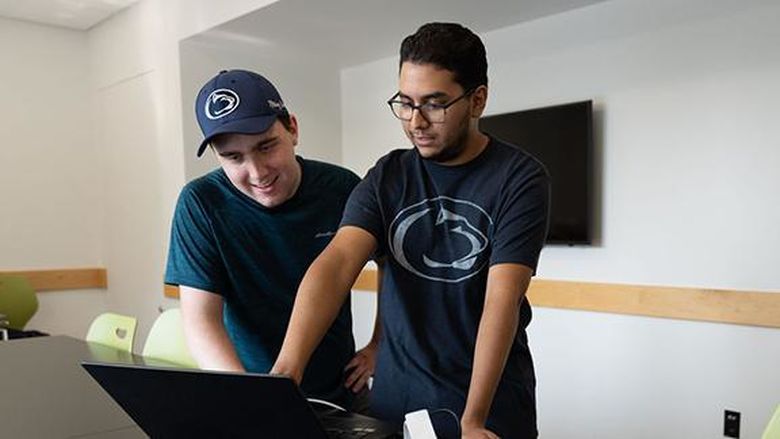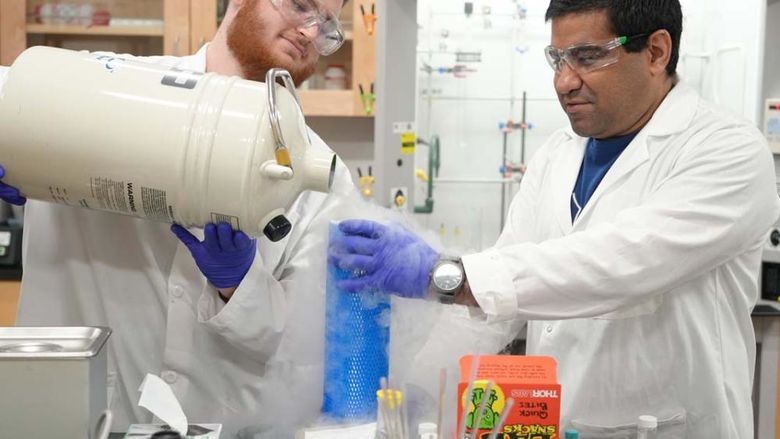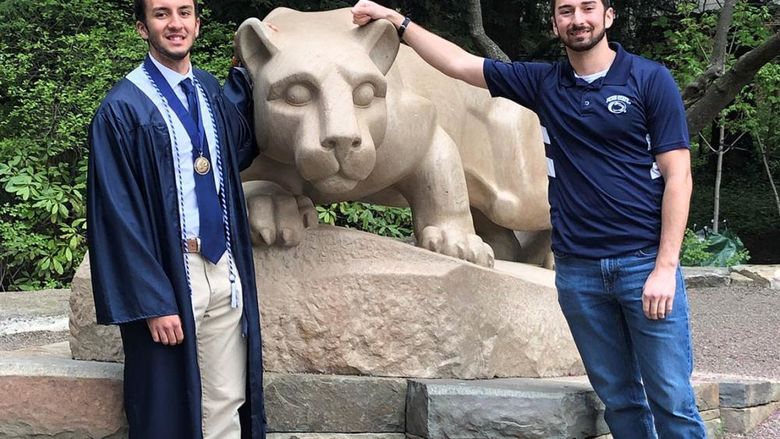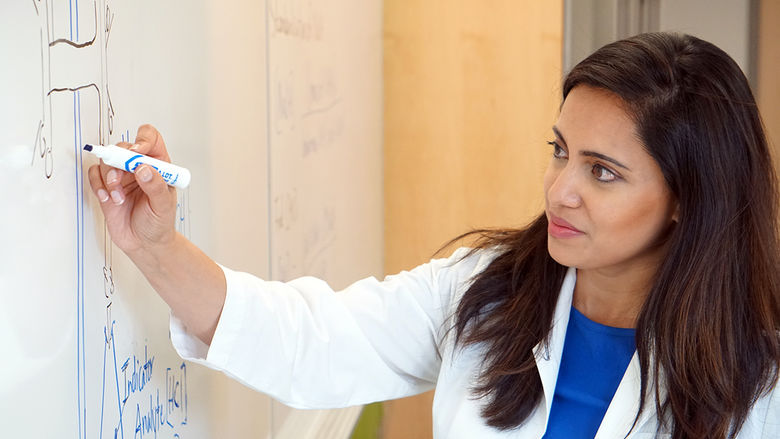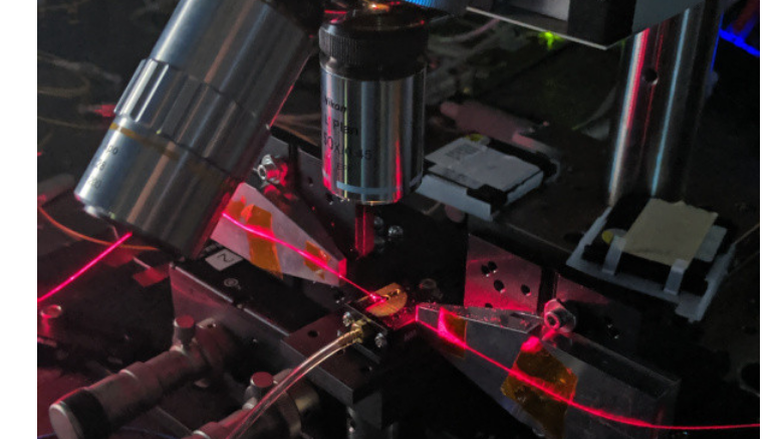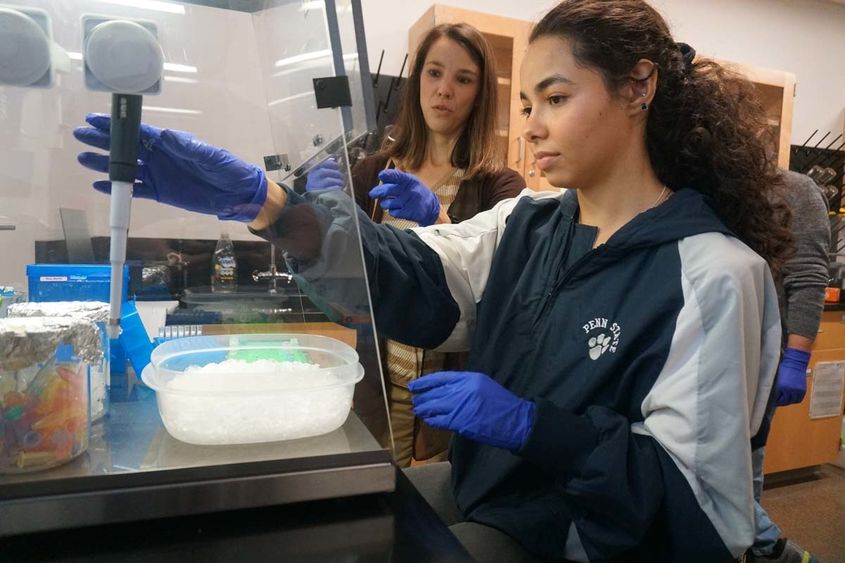
Penn State Hazleton second-year student Angelica Sofia Pares Alicea works alongside Assistant Professor of Biology Megan Schall in the molecular genetics research lab.
HAZLETON, Pa. — Between classes on a recent fall semester afternoon, Penn State Hazleton second-year student Angelica Sofia Pares Alicea stretched a pair of rubber gloves over her hands, pushed back the sleeves of her Penn State hoodie and got to work in the campus molecular genetics research lab.
Working alongside Assistant Professor of Biology Megan Schall, the day’s task involved extracting DNA from aquatic worms by performing polymerase chain reactions, a technique used for producing copies of a specific DNA segment, with an overall goal of learning whether the worms are carrying parasites harmful to fish in the Susquehanna River.
After previously working with Assistant Professor of Chemistry Eshani Lee, the undergraduate research project marked the second time Pares had worked as a learning assistant under the guidance and mentorship of a female STEM faculty member, a relationship she said was important to her as a young woman aiming to make her own mark in the field.
“They’ve supported and encouraged me to explore different things and it means a lot coming from them with their accomplishments,” Pares said. “I feel like the STEM field needs that diversity and it needs that representation to come up with new ideas.”
Schall and Lee are both members of STEM for All, a campus group led by female faculty in the science, technology, engineering and math disciplines, and Career Services staff.
The group, which also includes Assistant Professor of Information Sciences and Technology Nargess Tahmasbi, Assistant Professor of Engineering Mesude Bayrakci-Boz, and Career Services Coordinator Kaitlyn Krasucki, works to bring awareness to STEM by highlighting its members’ own unique experiences. It has held career chats and other interactive events for students to receive a first-hand perspective.
“We have a powerful representation of women in STEM at Penn State Hazleton, so we want to make it known that there is more than one pathway to participate in STEM,” Lee said. “We have many first-generation students here who are interested in STEM, and we want to discuss their challenges while sharing our own challenges.”
‘Best thing I’ve ever done’
Pares was born in Puerto Rico and moved to Mountain Top with her family when she was 11 years old. She said her parents, both nurses, wanted to move to the U.S. to find better job opportunities. Her interest in STEM grew at their encouragement, including one Christmas when they bought her a microscope.
“I was attached to it all the time,” Pares said.
When it came time to make her college choice, Pares picked Penn State because of its reputation and roots in STEM research, she said. She decided to start her college career at Penn State Hazleton to save money on tuition, commute to campus and get involved in undergraduate research right away.
“It’s probably the best thing I’ve ever done,” she said.
After initially majoring in biochemistry, Pares became interested in crop production and sustainability and decided to pursue a bachelor’s degree in plant sciences with a plant genetics and biotechnology option. The program, part of Penn State’s College of Agricultural Sciences, is designed to teach students the theoretical and practical skills of plant genetic manipulation needed in plant biotechnology, plant breeding, and genome research. She plans to continue pursuing biochemistry as a minor.
She got involved in undergraduate research during her first year on campus thanks to encouragement from Lee, her chemistry professor at the time.
“She ended up looking up my research on her own and asked if she could help,” Lee said.
Pares collaborated with Lee and a team of undergraduate and graduate students on research that examined language barriers in STEM, where she played a critical role in data collection by conducting surveys with students at Penn State Hazleton and the University Park campus.
Moreover, as a student whose first language was not English, Pares’ experiences tied in directly with the mission of Lee’s research, Lee said.
“Our research involves breaking down barriers in STEM, and the techniques we’re using are based on things she has experienced. She has that vantage point as to how someone who didn’t grow up here or whose first language wasn’t English approached chemistry,” she said. “She’s been an extremely valuable asset to our team.”
Pares and the rest of the research team even had the opportunity to present their findings at the Biennial Conference on Chemical Education in Indianapolis and will be presenting at another conference in the coming months.
“She’s developing valuable skills like critical thinking and problem solving,” Lee said. “These skills are valued in any discipline.”
Career benefits
A few months later, around the end of the spring 2022 semester, Pares began working with Schall on her research into smallmouth bass populations in the Susquehanna. Schall said Pares' passion, personality and determination stood out.
“She has a lot of fun in the lab, and I love to see that,” Schall said.
Schall’s research features a molecular-based diet study of flathead catfish in the Susquehanna. Pares’ role involves analyzing the DNA of worms to identify whether they may be potentially harmful to the fish species, a task Schall identified as “senior-level research.”
“She’s developing really good skills that will give her a leg up on her peers as she continues advancing in her career,” Schall said.
Pares plans to transition to the University Park campus in fall 2023 to continue her studies in plant sciences. She said she hopes to continue building off the skills and experiences she received at Penn State Hazleton by finding a research project that fits her interests and career goals.
“I know I wouldn’t have gotten this experience if I went anywhere else,” Pares said.
